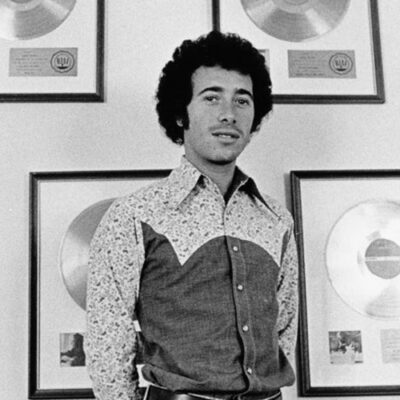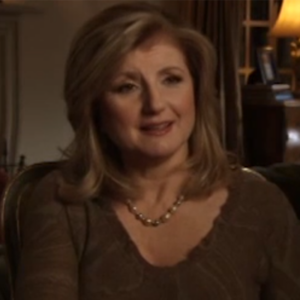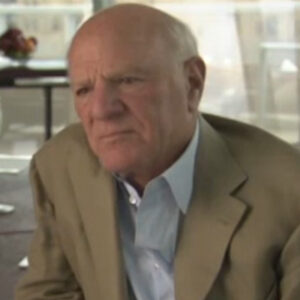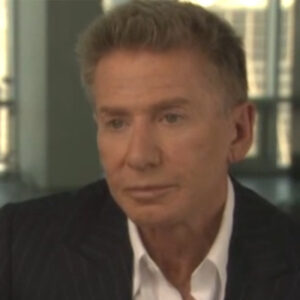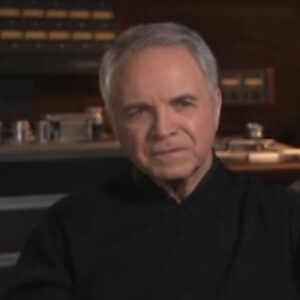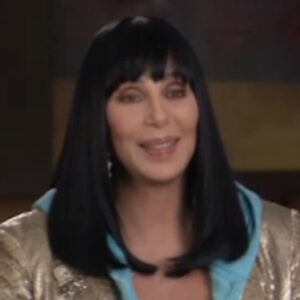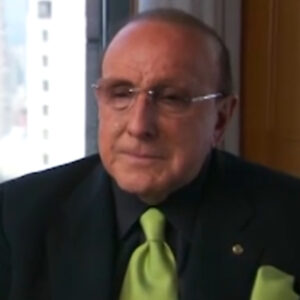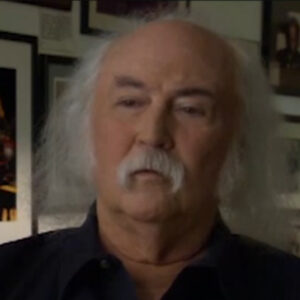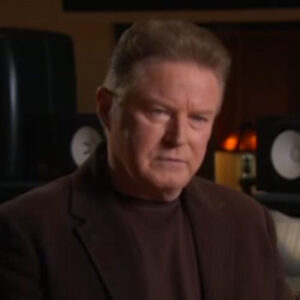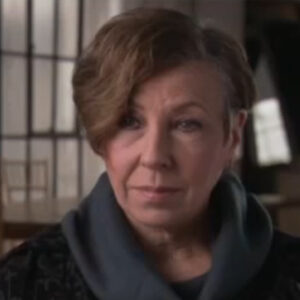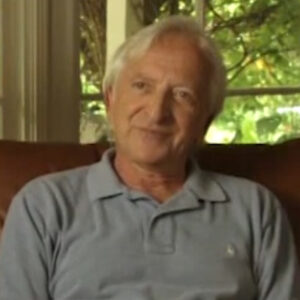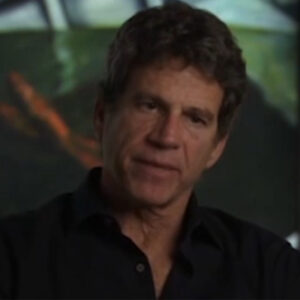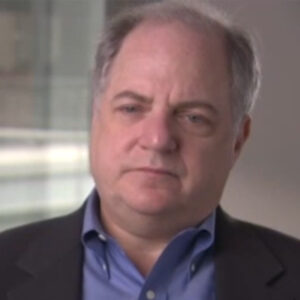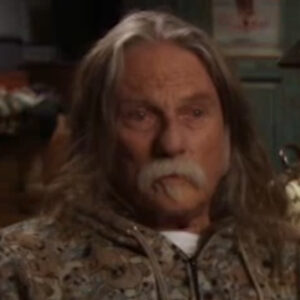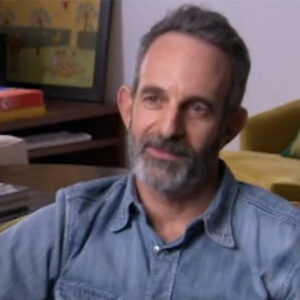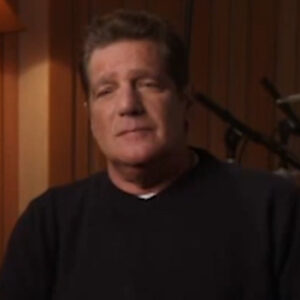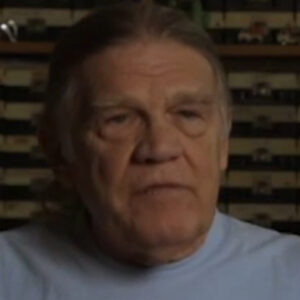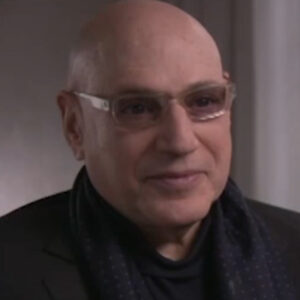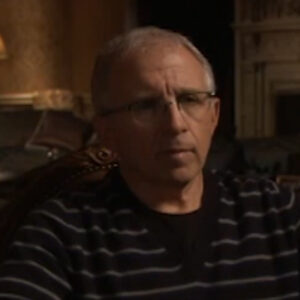Speaker OK, we’re ready to start here. So tell me, what did you know, David, before you actually met?
Speaker Well, that he was a celebrity and he was always being quoted in page six or something, you know? And that’s the feeling I had. And of course, he was mainly in the West Coast, but we all knew about him and how he made it to the top from wherever that kind of thing. And. Well, that’s that’s what I know.
Speaker So did.
Speaker I mean, what did you know that one day that John was saying that he met David in L.A. and you knew he had a very good feeling about him? I think David was dead. Well, then it was Cher. I think Cher and Dave.
Speaker I think it was at a Phil Spector recording session.
Speaker Well, I think it was a little bit before that, though. Okay. Yeah, maybe. Yeah.
Speaker Around that time they had met before. Okay.
Speaker No, I think. No, no. Around that time. Yes. Probably not people.
Speaker What did you know about asylum records beforehand? I mean, were you aware of the artists that David had signed.
Speaker Was signed, picked up, picked up a beautiful, incredible selection of talented artists. And and he made them all happen, I suppose.
Speaker So how did you meet John to take a break from music when you when he made the decision to go back to recording? Yeah, I was about that.
Speaker Why did you decide so well? Well, you know, the things who decided not to do anything about recording or writing songs or something like that, we had to me mean John was writing. I was ranching. And then finally when John was in Bermuda, I said, well, you know, we should make an AP at least, you know. And so he was so cool. But and he was very, very happy that I said that, OK, I’m gonna do EPO, Greg. But then EPO at the minute, we said that, you know, I got so many songs and he got so many songs. So we were just exchanging songs over the phone. So then they’ll go. But we have enough with LP. And I think was five years after the one that will make people.
Speaker So those if I know what Publius I hired to sort of. And as soon as people realized that we were gonna go into the studio, I think all companies or music companies approached us banging down the doors.
Speaker Exactly. How could you say that? I mean, they were really everybody we knew would be good.
Speaker Well, they were very aggressive. Yes. But David wasn’t. David was not an aggressive person in that sense. And he did the right thing, actually. Well, tell us the whole story. Well, so, you know, these very famous president of different companies called. Well, we were already in the studio. And there’ll be a call. And Jozo, once again, wanted. Did you go and get it? I know, sir. May I help you? And I want to talk to John, put John on. You know, it was like nobody wanted to talk to me because I was such a famous bragman and. Well, I think that they felt that was beneath them if they started to talk to me. And the reason is because they all knew that I was doing the business. So John said, look, everybody knows that you’re the one who’s doing the business. So the person who talks to you about it is the one. And so whenever there was a call like that, you just give it up like that. And in the case of David, he sent me a telegram. I should have kept that telegram, but I would think about those things anyway. So. And asked me directly that he would like to meet me. And I said that to join us. Well, that’s the one then.
Speaker How wonderful it was. Oh, I love that story. You told it just now. So what was your first impression when you met him?
Speaker Well, because of the route. Yes, the my office in Dakota that a building. I know his brother nervous because I’ve heard of his. Well, no, nothing bad. It’s just that, you know, he was such a famous person. I mean, he was not just a sort of a present of a record company, which most of them were. But he was kind of like a little icon is a very strange word at that point, probably because he was not an. Oh, yes, but, you know, somebody that was so that was always in the news. And John do want to meet him. John Subordinate’s business. You got us. You’re jealous. This was a bit news when I met him. I said, oh. Because he was wearing. I hope you don’t mind that I tell this story, David. He was wearing all white. A white. No jacket like pants. But not in a kind of fashionable way. Did it seem like it was almost like a milkman or something set up? What is going on here? You know, and I’ve never seen him in that outfit in any photos. Do you know why he wore away? Well, I found out that, you know, but it.
Speaker I read that he heard that way. That you love the color white.
Speaker I know. But you see, that’s David. And I really think I respect him for that. I think that’s the reason why he he made it because, you know, even if you hear that, you know, somebody likes White, would you accommodate that means just a little bit too embarrassing. You know, and so most people won’t do that. I mean, I don’t have to go that far. You know, is how people would feel pretty. But he just doesn’t mean she did.
Speaker Well, maybe you was as big a deal for him at that point, Julianne. He went to impress you. I know. It’s amazing. He really fretted about what he was going to wear, usually because he always wears the same thing.
Speaker Well, do you see that? But it’s very interesting that he cared about even down to what to wear. And that’s not like I didn’t know that then that he did it because of that. I thought maybe he likes why, but it’s just it’s so sweet. I mean, even the telegram to yesterday when nobody wanted to do that for me or did you do that to me or whatever, you know, because of such a bad reputation I had. And also being a Japanese woman, why would they have to come down to talking to me about business stuff? And he didn’t care. He just did it. Did you like him immediately? Well, I thought he was very. Yeah, I know. OK. Is that the like or dislike? I just felt that he was a very intelligent man, but also the sense of humor, because, you know, I think he was embarrassed. She was wearing that. It was so rude. Isn’t this crazy kind of look, you know? So that was good.
Speaker So tell us about your first meeting. Tell us what they exchange. I’ve read about it. You need to tell us.
Speaker Well, I mean, if you read it, probably, you know, more to the point as well. It’s business. Business talk, you know. So I don’t know if I should talk about.
Speaker Oh, he wrote about it. I mean, it’s a memoir is about John Lenity recounts meeting. He recounts the conversation. It’s kind of a great, great exchange between the two.
Speaker Well, I’d like to read that then. Well, I tell you what he said. You asked him why.
Speaker You asked him why should we sign with you? Oh, no. You asked him first. Do you. What do you know about us? Yeah. So he said, well, I know some of John’s records. And you ask him what he said. No, I don’t. I just she signed with him.
Speaker He said, because I will I will really care about your record company.
Speaker But also I like the fact I think I like the fact that he was honest.
Speaker Well, maybe you could tell us.
Speaker I mean, I’m going to remind you. I. Okay. I know. I mean, I can’t. Yeah. So you remember. I can confirm something.
Speaker Well, I’m not going to be a little hard on you, David. You know, we can have you and David telling the story, but to me, the best part of the story. Is he you asked him how much he was paid. And he said, well, you tell me what you want. If I can’t do it, I will. And if I can’t, I won’t. And you said, OK, I was going to go with you. And then you said, do you want to hear the music first? And he said, no. When you’re ready to play.
Speaker So that’s it. There was something that was the main thing for me, which was the fact that he said, you know, he’s just a businessman and he doesn’t understand music, which is not true. But I think he was putting it like that because she knew how Joan would have felt because. And I thought that was very clever. I’m just a businessman. You know what you want what you want to do is what you want. You’re gonna do so. And I think that that was a very right approach for John, because I’m usually businessmen in the music business would like to sort of control the artist. So this is this shouldn’t be like this in the remixes with a bit. Don’t you think? Or whatever. But of course, on the Target book, Joan, you just don’t do the.
Speaker Now, David had had asylum records and then he dropped out of the business for a while. He had a health scare and then he found out he was OK and then he came back with it. And you were among the first artists that he saw almost first?
Speaker Well, I don’t I don’t think was the first, you know, but I mean, one of the first early ones you think is. I know John.
Speaker You have Rodion. I can understand it.
Speaker I mean, he he writes about. He’s never in a million years thought this was going to happen. Really? Oh, it was a pity for him. But why did you have confidence in his in this label? Why did you have confidence in him?
Speaker Well, one of the reasons. Well, of course, you know, she I felt there was highly intelligent guy who’s very caring about what she would do for us, which is more important than somebody that we knew that was very famous for being powerful. Something I can go for the power. I went for the caring. And those show that. The sense of humor that most businessmen don’t have. It just kind of it in our position, we wanted to work with somebody that we feel comfortable. And much more than the deal, really. I look with it. The deal breakers that we just wanted to make sure that we will not give copyright Perpich in perpetuity and that that was important. I don’t that I just want to have a more comfortable time with somebody.
Speaker So. Did. What was David’s role, was he around when you were recording?
Speaker No, no, no, he was not really overwhelming like that. I think that he made a point of letting us be ourselves in a way. But then he came in was no. Well, we asked him, you know, we said the world, you know, do you want to listen to something? You know, we’re ready to let you listen to something. And he came.
Speaker And what was his reaction?
Speaker Well, you know, he he he. Well, you sort of say, oh, this is good. Or this was something. That’s exactly what she said, that, you know. Well, you know, I’m just a businessman kind of thing. But he was excited about very MyCelx. They excited.
Speaker But do you remember he was jumping up and down?
Speaker Well, I wasn’t exactly jumping up and down. I’m sure we don’t did that well, but. Yeah, well, you know, he was cordial. Because I see this and I think, well, maybe he was, but see, that was sort of traditionally somebody comes to the studio. This is great. Oh, my God. Fantastic. I mean, they they played up so much, you know. But he wasn’t like that. And that was. That’s good. It was natural.
Speaker He tells the story. Well, hopefully he will tell us that that John really wanted this record to be about you.
Speaker Well, I did that when he came to listen to the things I think John played my first kiss, kiss, kiss or something.
Speaker And then he told David, you know, this is about Yoko.
Speaker You see this. And as I was turning in that, you know, it was at the time of our lives that especially with John. So he had all the accolades. He was successful in conquering the world, et cetera. So, you know, for him, it was much more interesting to see my work come out. Right. I think.
Speaker Yeah, well, that’s what he told Yoko, not gotten what she deserves. And this record is about her. We have to take care of you.
Speaker Well, yes. And I’m sure that baby was the take ticket with me both. I don’t think she knew what she was going to take, you know.
Speaker Were you happy with the way the release was handled?
Speaker Yes, it was really great. Yeah, it was just the right degree of showing us his caring. You know, there was you know, it was like standing the elbows and sort of thing. Do this. Do that. Well, I think this is what, you know. Never like that.
Speaker So the awful day was was David in the studio with you? Yeah.
Speaker Yeah. Yeah, yeah.
Speaker Can you tell us about what he was. You were playing something different. Yeah. Walking on thin ice. And what what was that exchange?
Speaker I know it’s too hot, but I know that he had said that you wanted you played him something and you wanted to put the record out before Christmas. And he said, let’s wait and do it right afterwards and I’ll take it out and said, is that well?
Speaker I don’t remember the psychology of Jessica, but I think I think that is probably the right thing to say at that point, to be there in my chair. Merry Christmas.
Speaker So David was with you and John, and then you went back to the Dakota and he went home and then he got a phone call. Why was why was he called? What? Who called David and why? Why was he one of the first people to be called? I called you.
Speaker Why did you call? Well, because in our lives, especially then, we didn’t have any friends. We were sticking to each other. But I think that the most the people in the music world really particularly didn’t care about us. And so we weren’t our friends.
Speaker So you really regarded David as well?
Speaker I think that he was our daddy. Huh?
Speaker So he he really took care of you during this time.
Speaker Yeah, I could not think of anybody else to call. And he came and I, by the way, which was nice and.
Speaker And from then on.
Speaker No, she took it to himself to arrange things for me.
Speaker So he was there during all of the weeks afterwards and took care of you. Kept you away from the press. Took you out.
Speaker He did everything. I mean, he must have been very difficult for him, but he did.
Speaker Do you remember that he stopped advertising and Billboard magazine because he was very upset with some articles that they were writing. You know.
Speaker Yeah. They’re big doing them with that. Yeah.
Speaker But it’s because I guess they published an insensitive article about John and he was angry and he withdrew his advertising.
Speaker So I’m not going to advertise which one, which I’m a good listener. I don’t remember the article. Remember? I mean, I remember Basinet and you know, he just said, don’t do it.
Speaker How did you feel about afterwards? Double Fantasy, of course, became a huge record. The irony of that. How can you talk about how you felt? Obviously, the music was reaching lots and lots, but, you know, we were very good people, you know.
Speaker So we couldn’t surpass Kenny Rogers because you just were sitting there. No one all the time, you know. And finally we became Dub Dub Conable. And we I remember those things because for me on behalf of John, that was very important that, you know, that we were number one even after John’s passing. And, you know, I didn’t feel like John was really away. I felt that we were both watching it together. So anyway, that was how it was. And the fact that double fantasy was number one, because we felt that the performance should be number one. So and there was a surprise that when the single was number eight in in Britain and I felt it was my fault because I was doing the business and everything.
Speaker So I went to John and said, I’m sorry, John, number eight, and it’s not going to go up. And just looked at me, said, well, we have each other, you know.
Speaker Yeah.
Speaker It was like being kicked around and being attacked by the whole world.
Speaker Both of us. You know, for being together, which is an amazing story extra.
Speaker David writes beautifully about observing the relationship that he’d never seen two people who were so completely a whole. To have made the perfect goal. Right. You must have been a lot of time together.
Speaker Can you tell us how did that go? Twenty six hours a day. Twenty six hours a day. You and John and David spent a lot. Oh, David. Yeah, yeah. Yeah, we did. But, you know, because they bit was a busy person, he was in West Coast most of the time. So when she was in New York, we spent a lot of time.
Speaker Do you have any particular memories of things you did together? Was that John and David become close to. I know you always have a special relationship with John and David also become close.
Speaker Well, I think that John already like David before I met John David, you know, he he met in L.A. and so there was that. But I think that there was a very big difference between somebody other than us and us together kind of thing. I mean, we will have that kind of people. Rudy.
Speaker Yes, it’s a you almost made a little fortress around yourself, too, I suppose.
Speaker Well, I didn’t intend to. Well, maybe it probably worked at work both ways. The world didn’t want to really invade us for so many reasons and and be sort of we were not feeling bad about it.
Speaker We would have also never had a child who became a big fly now. David wrote about that as well. Really? I want to give you this article that he wrote. Beautiful.
Speaker I think we have a memory of John and you. And this is quite beautifully written. He talks about how this changed your life when he first met John. I think John was not in good shape as well.
Speaker Well, I’m sure you see the end. I don’t know if I want to go into that, but the fact that John always felt that I should be 100 percent with him. And so, you know, if I’m talking to David on the phone or something like that, things that David, you know, it’s a bit like that. So I think that I was caring about that. And also, David, I’m sure he’s intelligent enough to know that they must think that Joan was very possessive about me. So we didn’t V.T. sort of the. I know we can really try to get close to each other, meaning the three of us. And what I remember more is the fact that how he helped me. And was there for me after John’s passing.
Speaker What are some of the particular things that I don’t want to make you dwell on something that’s painful for you, but this is a film about David, so I’m wondering if you have any particular memories, particular things he did, or was it just that he was a steady presence for you in those awful months afterwards?
Speaker Well, you know, you have to understand that. I mean, I had to take up or different aspects of my life. I see John passed away. The most important thing was for me, it was shown, of course, that she was wealthy. I know that. And also, you’ll be surprised what we don’t have to go through when their husband dies, because forget about the sorrow of it. Of course there’s that. But what about inheritance tax, about all legal situations that you have? They force you to think about that. And I was in bed, Mrs. Diamond and David just not the door and said, excuse me, but you have to sign this document or something. It was always like that. And I wasn’t a big put in a very complex situation as well with the Beatles and and John’s first family and derivatives and all that as well, and protecting my son. So what? But David was always good about reporting to me what he is going to do. He is doing in the business. And so it was really I felt that I can trust him.
Speaker And also I felt that he was making it easier for me. Definitely.
Speaker There’s a story like this, Calvin Klein told us the story that you were both very worried about because you were eating. Want to go out of state. They came over and snuck you out the back and took you to a restaurant in Harlem.
Speaker Yes. David Coggin and David, I think. Well, you know, that’s another thing that they’re most archaic notion about what a widow should be was prevalent around in history. Interesting that Saturday they became you know, this is sort of music people hip supposed to be hip people, but they became very critical of whatever I do. So they couldn’t understand how I allowed Davidson copping to take me to an Italian restaurant. What am I supposed to be doing? I was just always at home or something. I don’t know.
Speaker I mean, there were people who thought you shouldn’t go out to dinner.
Speaker Of course. And how dare you did that or something? I was criticized. I praise you with them. And they protected me for not writing about it. Some people. It’s strange, isn’t it?
Speaker Well, I think particularly when I was married to someone who was so famous and loved, everybody feels that little piece of that person.
Speaker Oh, yeah. Yeah. Everybody feels like they owned Joan.
Speaker And therefore, this big family of judgmental people that we all know, that judgmental family is a huge one.
Speaker Yeah. So in a situation like that, I think that you would he probably was very hot for David, too, but he was not complaining about the choices. Whenever he called me, it was always some was enough mood. And one thing I remember very well one day I remember very well is that the visual the day of the visual. And it was a very cool day. And people gathering in Central Park and also standing there. And the David and I were in my apartment sort of watching that while watching media. We were an individual with them. But through the window, I was there.
Speaker You were there. Oh, wow.
Speaker I had a small child. She was that two and a half. And I just lived up the street. I still live there. Ninety fifth. Central Park West. And I had to go. I just had to go. And I asked my husband to stay with me. I didn’t want to take her because she’s too real. I just walked down there by myself, stood there. Thousands. Thousands. I mean, you know, really?
Speaker Well, I wasn’t counting. Yes. But, you know, I think that it was a situation that in an ordinary situation that. I wish I could have taken some painkillers, something like that, because it was really very difficult. And and there was a suggestion of that. And I think that the first night I got some injection of painkiller injection and I thought, I cannot do this. I can not become the person who’s relying on this because I have to take care of my son. So from the next day, I just. And thank God I didn’t.
Speaker He must’ve been quite a temptation, though, because I can understand.
Speaker I think, you know, because there’s too many things that I had to take it and the things that I had to take off or if I’m not careful. It was a trap in a way that I had to undo.
Speaker David has a has a reputation, as you know, for being something of a business man. And then there’s this other side of him, which is his.
Speaker You know what? You know what? I really realized that I mean, I realize about. I think that all of us were in the same boat that way. Like John me and David people. I think there’s a jealousy factor or something so that they like to make up stories. So if we were not careful. And one day said, oh, yes. You know, you said to say good morning. You know how Rudolfo. Something. I mean, this that you know. And you can’t always be so nice. I mean, that’s not human.
Speaker Did you meet somebody when David was honored at some of them once? There were two things that Warren Beatty said about him. One is he described him as a captain of industry with the soul of an artist. Would you agree with that?
Speaker I definitely think so. I think he was sensitive enough to be an artist, but I think he took the other out. And thank God for all of us for this. But, yeah. Sense of use, their sensitivity in business building.
Speaker And he also said that immobilized David Geffen was somebody you wanted working for you rather than against you.
Speaker Yeah. I can’t imagine him working against us, but you could have that. But there’s no reason. And, you know, he could have I don’t know. I mean, I didn’t know that side of him, really.
Speaker I think that’s what we’re getting at. I mean, that’s not a side of him you ever saw. It’s probably who knows whether he ever had that side.
Speaker There is a reputation that was you know, he was not just a sort of a sentimental person at all.
Speaker So, you know, ending television so that that combination probably would make him take a very intelligent, logical direction rather than being generous or whatever at times.
Speaker What do you think about the direction his career has gone in since he’s left the music business that you’ve stayed in touch? Yes. So he’s he’s not the music business anymore?
Speaker No, no. Well, you know, whatever he does, he does it in a kind of grand way, you know? And I like the.
Speaker Did he talk to you about DreamWorks when he was going to start DreamWorks?
Speaker No, I know he did. Tell me about it. I mean, I just knew that he did it. But.
Speaker What do you think makes him unique one? What do you think makes David unique?
Speaker You’ve said that I have this. You know, it’s no tip of my tongue and I just don’t know how to express it. But I was thinking that even I knew that he would ask that question. So singular all day. But know something about.
Speaker He doesn’t really care for the the normal procedure or the commonsense of a person who should do it this way because actuary’s this, he just does whatever is most effective without feeling bad about it, without any hesitation. If he thought that was the way to go. And and that’s his strength. Did I step? OK. May I say this again? I think that the fact that he ignores the common sense, he ignores how people think about what to do, etc., and just go for exactly what he thinks will get him what he wants. And I think that’s I think that’s his strength.
Speaker Were you surprised when David came out as a gay man?
Speaker No. Why?
Speaker I just wondered. I mean, he I don’t think anybody knew him well. I don’t think he kept it a secret.
Speaker He also flaunting it. Laughing I did make a very public announcement. Me. I’m doing us well. Doing what John and I would do with him. It never came out. It never came off as a question or anything or. Well, either way, I mean, we didn’t discuss about it and we didn’t even think about it, really. I mean, as far as we were concerned, you know, he was very hot with the shirt. Well, something like that, but. Well, I. I think it’s very healthy for gay men to come out saying that what what they are. But I have so many gay friends and most of my friends are gay. So it didn’t really surprise me, but felt that was good. Good that he did. I mean, his position is a very different thing probably to come up, you know, and and it was a statement and I think it was became a role model, I think, in Hollywood.
Speaker It was one of the first, I think, to. To do that, a lot of people have been living under some kind of cover and it’s like, OK, it’s all right, it’s OK.
Speaker You mean around that time that there was still like that?
Speaker Probably because it’s completely changed now. Did did he ever talk to you about his dreams, his hopes, what mattered to him? Did he ever share deep and intimate things with you?
Speaker Well, just like all of us. I don’t think he really had any goal per say. You know, he was just enjoying the turn of events and how his life is changing or he he’s making life change, you know, and that’s how we are. We all like that. Did he ever talk to you about his excuse me, as opposed to people said, I’m going to be the president of the United States? Somebody who’s going to go? I think with the kind of people most people in the music business may all or artists just enjoying what’s going on, you know, a little and then reacting to to it or doing something that they think is appropriate in their circumstances.
Speaker Do you think he’s he’s found happiness in his life?
Speaker Well, I think he’s still pursuing.
Speaker I think he has a wonderful time, actually. And now I think he’s reached a comfort level. Well, that’s good. He has a relationship. I heard. Have you met Jeremy? No. When did you see David last?
Speaker About two years ago. You know, I stayed in this place. I mean, the one in L.A., you know, not the money. It’s quite a mansion. Incredible. Yeah.
Speaker There was the jerk. It was Jack Warner’s. Yes. Fantastic. Beautiful house. And what about his his art collection?
Speaker It’s incredible. See, that’s what I mean. I don’t stamp when he does something. He does it like completely.
Speaker And is there anything that you just want to talk about with David that I haven’t asked you? I mean, I just read say whatever it is you’d like to say, David. Anything you think I forgot, I should have asked.
Speaker Well, she’s kind an incredible delicate and sensitive hot that people don’t know probably. And I think his whole life is just covering it. And he’s a very unique person. And we should be very thankful that there’s only one David Geffen in the world.
Speaker Well, that’s interesting that you said he spends most of his life covering the whole show. Why do you think he does that?
Speaker Well, I mean, old, delicate, sensitive people have to if they want to survive, they’ll be crushed. Yeah, it’s a security blanket.
Speaker Do you think he’s less covering it now that he’s not in business anymore? Really?
Speaker He’s still very hot. I’m sure. If you have a relationship in it, that alone is not not all heavily, you know.
Speaker You know that we all know that, Jessica, if you have anything you want.
Speaker A.
Speaker Do you remember when he said this, because maybe David will tell us this story, but it’s so cute when he said he was going to take an ad out for the album that was following double fancy. I think season of glass. Let’s do it right. I’ll take out an ad and John looked at you. He said he was so excited and he said, Mother, you’re going to get an ad.
Speaker Did you. Do you remember that?
Speaker No, I don’t. But you see, the thing is, I was just always thinking about what I have to do in terms of business in business kind of thing that I felt responsible. But I was never thinking I was a businesswoman.
Speaker And also as an artist in this simple sort of the levels of a situation, I had to take, you know, business writing a song, recording a song so that as well, John, as well as helping John, you know, I mean, helping John to have the right environment for him to do things, you have to gel your own careers.
Speaker Pretty fascinating. Nick, I think we should make a song that you text. Oh, sure. No, I mean, you were me. Really. I think we were so far ahead of your time. Well, now people are recognizing what.
Speaker Yeah. But at this point, partly my fault, too. I think because of when you’re so attacked by the whole world or something, then you find a way to hide. So a lot of things, though. My life is pretty hidden. Not bad things. I’m not hiding something. I’m guilty of anything. But it’s just, you know, it’s easier to not being out so much to protect yourself.
Speaker Protecting him from criticism, people not understanding you. I think you. A lot of that. Yes.
Speaker I think you’ve handled it with incredible dignity and you just kept working, being who you are. It’s now very recognized.
Speaker Well, Senate, it’s very interesting thing I just remembered. You know, if I really think, you know, like emotionally, when you get stuck with something obsessive about something stuck with pain or whatever it is, it’s just sort of like a it’s not good for your health, you know. So there’s a whole sort of movement of really silly things. And I don’t know, David probably didn’t know anything about it, but David had an kind of inner strength. No, don’t call it inner strength. What is it? It’s a way that he handles things that probably she learned from childhood when things were very difficult for him. She just said, well, I don’t mind. I don’t give you names like who pursues things. But if it’s not available to him or if it it it turns out to be not how he wanted or something or it turns out, since something is leaving him with something, he just let it go. No. And I think that’s very interesting that he had that side of not really being obsessive.
Speaker Well, you know, he did pursue lots and lots. Yeah. Yeah, of course. I was weak for years. And he pursued asked all kinds of different programs. I’m sure he did primal therapy for you. Yeah. Although he was searching. He’s a soul searcher.
Speaker He was searching for a way to better his life or the way to make to make himself more comfortable with him.
Speaker And I think that that’s a kind of 60s trend builded that. But up in this book, in his case, I’m not talking about what therapies he went through. I’m talking about in real life when he has a situation that is not working and he’s capable of just releasing it.
Speaker You talked about his difficult childhood. Did he talk to you about his time?
Speaker Well, I don’t know. You know, he didn’t really, but I sort of saw that or I kind of got the picture from far, too.
Speaker Probably not. Not thinking of telling him.
Speaker But what did you think the picture was? What’s your in what’s your impression of.
Speaker It was.
Speaker Well, it’s it’s a kind of I don’t know what that language should be forced, the words should be seen that working class, but it’s a kind of working class situation that that his mother already took care of everything. And it will probably be very hard for his mother. And he will be known knows the.
Speaker He learned a lot from his mother. I read you during the war, obviously some very difficult circumstances in your family and your mother.
Speaker When you see this, I think took care of you. All right. Well, yeah, maybe it there’s this sort of like a mist that we were begging for food or something, but that was not what it was. That was just a myth. That’s a myth. I mean, I was stopping and everything. I mean, most people from the city were starving, but we bartered things. You know, it’s like we had, you know, beautiful silk kimono and we would barter that with a bowl of rice with this. But that’s not big. Oh, no. But also, my mother was always in Tokyo, most of us in Tokyo, and she had a totally different life from me. I’m the one who is very young but still had to take care of everything. Yes. In a country, you know, because you were.
Speaker Because your father was.
Speaker My father was an aunt. They called Frank into China, then to Vietnam. And my mother left Vietnam in a concentration camp. And my mother was in Tokyo. But in that sort of class of ladies, there were been despots every night and enjoying it into the blacked out window in Sydney. And I was sent to the country with my younger brother and younger sister and a maid. And I had to be the one who struggled to get things for them. Amazing. In.
Speaker Well, I thank you very much. We’d love to continue to talk to you about you and your career for us.
Speaker Thank you. We’ll have a chance to. I hope I did justice today, David, because, you know, I really I really still feel that I owe it to him for that period.
Speaker Well, one of the most significant periods in your life. He played a very key role in his every day. He was right there.
Speaker But you see, when you tell me when you ask me, it gives the anecdote or something. I should tell you. It’s very difficult because I was the most basic thing at the time was that I was totally, totally saddened by John’s passing. It was just a sudden thing. So everything else was like, you’re taking care through that dream.
Speaker Do you remember him coming to the hospital?
Speaker Of course. That’s the biggest. The biggest moment. Yeah.
Speaker And then he took, you know. So he was a man by your side?
Speaker Yeah. Was anyone else there? No.
Speaker That’s a pretty, pretty major relationship, you know.
Speaker Well, yes, of course.
Speaker Well, I think you did beautifully. Okay, thank you beautifully.
Speaker You probably should.
Speaker But it’s the nature of the ED you say it’s about kinship. Do you feel a kinship with David? And what’s the nature of that kinship? You could describe it a little bit.
Speaker No. You know, everything that I told you about David, his character and how he deals with things, probably we’re on the same page right on. And that’s why I understand it. And so there was a very deep kinship of post between David and I. But also we’re the kind of people who would always try to dilute that situation by being very busy in our businesses and our creative activities, something.
Speaker So there was a good balance. I think.

